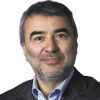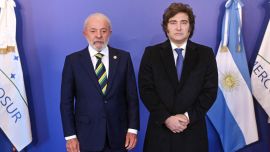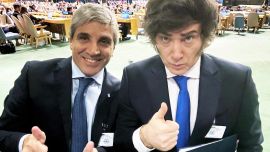“Start the race if we don’t arrive.” The racetrack metaphor employed by Axel Kicillof to reject President Javier Milei’s invitation to his proposed “Pacto de 25 de Mayo” agreement would seem to be in line with the acceleration he has decided to give his positioning as an opposition leader. Complete with presidential aspirations, of course, although nobody wants to mention it.
When inaugurating ordinary sessions of the Buenos Aires Province Legislature in La Plata, the governor thus opted for having little to say about provincial issues and plenty to differentiate himself from the President. He took advantage of playing to a home crowd of disconcerted and tense Peronists, buckled together by fear more than love.
It might be said that Kicillof’s national strategy placed him in pole position last October when he was comfortably re-elected against a divided opposition, but he slipped back to second place when Milei defeated Sergio Massa in the run-off. And with his state-of-the-nation speech the President served up – on a silver platter – a chance to move into third gear.
In his haste Kicillof can force the pace at times. When his Chubut colleague, Ignacio ‘Nacho’ Torres threatened to cut off the oil and gas supplies from his district in his federal revenue-sharing conflict with the national government, the Kirchnerite leader tried to join in the fight by pointing out he could blockade the ports and access routes of Buenos Aires Province. Like Torres, he later climbed down.
When Milei proposed a conditioned pact to the governors, many of the latter backed the initiative, including all those who continue using the extinct Juntos por el Cambio label and some Peronists. Until Kicillof spoke out, only La Pampa’s Sergio Ziliotto had rejected the invitation.
The opportunity for Kicillof was second to none and he took it. Apart from the obvious approach of blaming his province’s problems on Milei’s austerity, he sought all the time to contrast it with his defence of the role of the state, with quotes from Pope Francis included.
The response transcended that speech to be given a stage setting. Kicillof surrounded himself with everything identified by the national government as the “caste.” At his side was his lieutenant-governor Verónica Magario, heading the provincial Senate, and a powerful mayoral voice. In the audience were trade union bosses (Rodolfo Daer, Hugo Moyano, Roberto Baradel, among many others), Máximo Kirchner, Senator Eduardo ‘Wado’ de Pedro, the Abuelas and Madres de Plaza de Mayo, heavyweight mayors like Fernando Espinoza (La Matanza), Jorge Ferraresi (Avellaneda), Federico Otermín (Lomas de Zamora), Mayra Mendoza (Quilmes), Federico Achával (Pilar) – the list goes on. Absent with leave, Massa and Cristina Fernández de Kirchner.
Nevertheless, nothing is so linear in this dispute. Both Milei and Kicillof inject doses of political flexibility into their dogmatism.
Last Monday following his harsh inauguration, Governor Kicillof sat down to dinner at Expoagro 2024 event flanked by the CEOs of Clarín and La Nación. A few days previously he had turned to the Supreme Court denigrated by him to halt a presidential decree cutting off a trust fund.
Meanwhile President Milei, in his speech of March 1, avoided clashing with Kicillof by skipping over the multi-billion New York sentence for the deficient nationalisation of YPF, the circulation of ‘Chocolate’-type individuals picking up money from phantom provincial Legislature employees or Martín Insaurralde’s ‘Yachtgate’ scandal.
Yet the road projected by Kicillof has its bumpy patches. The main pebbles are to be found in upholding the Buenos Aires Province administration, affected by the general crisis (which is nothing new) and aggravated by plunging funds, which he tries to palliate with robust tax increases and by taking on debt.
There is no political motorway either. The Peronist governors are jealous of Kicillof’s proximity to Fernández de Kirchner and the power of the country’s biggest province, which might even jeopardise each district’s slice of federal revenue-sharing.
The governor also has internal difficulties. Despite a fragile truce since drawing closer together while celebrating Cristina’s birthday, Axel and Máximo are locked in a permanent duel. The legal impossibility of being re-elected in 2027, as with so many allied mayors, only whips up that quarrelsome nature. And furthermore Massa, who never gives up, is flying over.
Driving requires as many doses of willpower as precautions because pressing the accelerator carries the risk of going off the road – or crashing.





















Comments